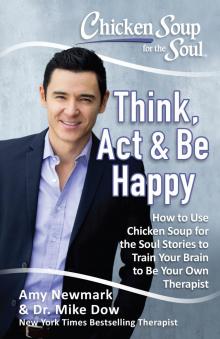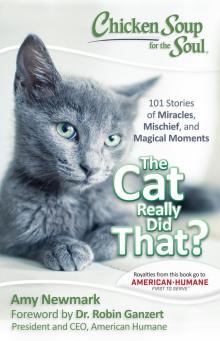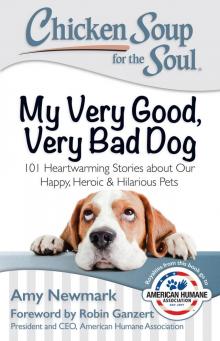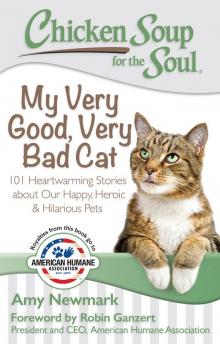- Home
- Amy Newmark
Reboot Your Life Page 4
Reboot Your Life Read online
Page 4
As a woman of faith I strongly believe that it was God’s nudging that put me on a different road. Me listening was the key to my success. I doubt if I would have reached the destination on my own. Only when I quit drowning my feelings did I allow my inner light to shine — just as God intended.
Thirty-four years ago I gave up an addiction to alcohol and have never looked back.
For more than twenty years now I have been blessed to share my writings in a public way. Writing from the heart is what fuels my soul, it is the reason I put pen to paper every day. I’m writing about what I know, focusing on the joys of family life, a life that I once thought was out of reach for me.
And that is the story of my dawn of new beginnings.
“Nothing changes if nothing changes.” Those five words are a powerful truth. I know. I’ve put them into action.
~Kathy Whirity
A Family Reunion
To know when to go away and when to come closer is the key to any lasting relationship.
~Doménico Cieri Estrada
My daughter and I unpack our luggage in our Florida motel room and slip into more comfortable clothing — cotton shorts, T-shirts and sandals. We have flown down from New York to visit my eighty-eight-year-old mother who recently broke her hip. My older brother, David, who has been undergoing dialysis three days a week for over ten years, has moved in with her.
“It’s a family reunion,” I tell my daughter, Zoe.
But, truthfully, it isn’t much of a reunion because there was never much of a union to begin with. That’s because there wasn’t much of a family to begin with. When I was six and my brother was eleven, our parents divorced and my mother married a man who was saddled with four needy kids of his own. My mother later admitted, “After six months of marriage, I knew it was a big mistake.” But she compounded her error by staying married for twenty miserable years. That was our family.
My sixteen-year-old daughter and I park our rental car in my mother’s concrete driveway and step out into the Florida heat. My mother’s pink-stucco, two-bedroom home nestles within a modest community built around a small golf course and features a plush green lawn, well-manicured shrubs, and tastefully arranged palm trees.
As I open my mother’s front door, my daughter sees an invalid sitting in a hydraulic-lift chair. This woman is watching television and the remote control is resting on her lap. Her hair, normally dyed and coiffured, is gray and hangs loosely down.
This invalid is my mother. But my perspective is different from my daughter’s. I see a young, beautiful fashion model, a successful New York City clothes designer who still is able to move around with the help of her walker.
“Hi, Mom,” I say. I pretend to hope for nothing more than some pleasant conversation and a hug or two. More importantly, I hope my daughter might finally get to know her remarkable grandmother. Maybe she’ll even get to know her mysterious uncle David.
“Hi, honey!” beams my mother, reaching out. “And look at you, Zoe! You’ve grown so tall!”
I bend down and kiss the top of my mother’s head.
Sitting on the couch beside her is my brother. I know very little about David. Perhaps that’s because he has always wanted it that way. By the age of fourteen, he discovered a coping mechanism to deal with our mother’s toxic second marriage: heroin. My heroin was boxing. Instead of sedating my sadness and anger, I punched it out. But all of that belongs in the past. David has moved on, and so have I. He is sixty-five years old and has graduated from Columbia University with a degree in social work. Me? I’m sixty and teach high school English.
“Good to see you, brother,” David says, embracing me. We’ve never been close, but I feel his warm hug and I notice the serenity in his face. It feels good.
“Good to see you, too,” I say. Our relationship has never grown much beyond “Good to see you, brother.” Our brotherly bond has always been fragile and, as the younger brother, I never was able to develop a sense of trust around him. Consequently, we keep our topics easy and non-threatening. Today, we speak about his recent retirement and the inept Florida Marlins.
While talking, I sense we both are attempting to establish a semblance of brotherly affection. But I am certain he wouldn’t want me to dig too deep and start asking delicate questions about his health or his personal relationships. So I remain silent.
Superficial and comfortable is best. We offer only the outlines of our lives, at least the version that we like best.
We are both smart enough to have left our guns at the door. It won’t be necessary for us to wear our protective armor this afternoon. All of our arguments, yelling and putdowns are in the past.
After an hour of easy conversation I feel more relaxed and trusting. Perhaps, at this late date, it’s best we aim for comfortable friendship rather than stressful brotherhood.
“You know what I like to do?” he says, looking out the window at the back yard. His voice is soft, tender and humble, and that surprises me. “Every week, I drive to the grocery store, buy a big bag of peanuts and bring it home. Then I scatter the nuts on the grass under the tree in the back yard. Every day I just sit here and look out the window and watch the squirrels, birds and the cat enjoying the nuts.” David’s voice, I notice, exudes a new sense of calm and equanimity, something I’ve never heard before.
My mother smiles with undisguised love and pride at David’s emotional tranquility and his recognition, and appreciation, of small pleasures.
My initial expectation for this family reunion had been small because our individual histories have been vast, bewildering and convoluted. My mother’s fashion career offered her a luxurious and expansive lifestyle, touring the world in grandeur. By comparison, David’s life anchored him to the streets of New York, where he cared for the city’s downtrodden. Me? As an English teacher, I have explored the world, and people’s minds, from the safety of my classroom and the printed page.
I look at David’s worn face and I feel the bite of mortality. My mother, brother and I are growing older and I fear that in profound ways we still don’t know each other very well. We have made ourselves unknowable behind our blind teenage rage, our middle-aged selfishness and now, perhaps, with our mature etiquette and polite superficiality.
There is no hint of anger or revenge. Complaints and accusations are nonexistent. Disagreements are left unsaid and past hurts are submerged, like icebergs, and will remain submerged. Maybe this is as good as it gets.
“Let’s watch Judge Judy,” smiles my mother, as she points the remote control at the television.
Throughout the day, I’ve noticed Zoe sneak quick glances from her iPhone at me, my brother, and my mother. Does she understand what has happened today? Does she understand that we were once enemies locked in combat? Is she aware that she is witnessing her family members finally at peace with each other?
Does she realize that her grandmother, her uncle and her father have emerged from our various personal journeys scarred, wiser and triumphant?
“Will we see you for breakfast tomorrow?” asks my mother.
“Bright and early,” I say, kissing the top of her head.
I look down at my mother sitting comfortably in her hydraulic-lift chair and realize her once expansive life will now become more and more limited. But that is life. “Mom, you’re still the prettiest woman in the room,” I say.
She laughs and her bright eyes twinkle. Her long, gray, uncoiffured hair and wrinkles don’t make her look old, they make her look eternal.
I look over at my beautiful daughter as we walk out to our car. I am so proud of her. At sixteen, she has already distinguished herself. She has maintained a high-honor roll status and has been selected captain of her tennis team. She makes friends easily and seems to be confident and have a healthy self-esteem.
“Zoe, I want the dysfunction to end with me.” I don’t actually say this to her, but it is exactly what I am thinking as we slowly drive home.
~Peter W. Wood
&nbs
p; Follow Your Heart
Run for Your Life
A sister is a gift to the heart, a friend to the spirit, a golden thread to the meaning of life.
~Isadora James
I used to babysit an angel. Her name was Pary and she was my younger sister. She was the youngest and my brother Kraig was sandwiched between us. Being the oldest, I was often called upon to watch over Pary when my parents ventured out, as they frequently did.
Times were different back then, safer. Our household was a free-spirited place and we were always encouraged to wander openly. Boundaries were few, and a skateboard and five-dollar bill could carry you far.
Still, when it came time to babysit, we were not to leave the house. Three rambunctious housebound kids became a recipe for mischief, and poor Pary bore the brunt of our practical jokes, like the time we mixed cayenne pepper in her milk or the time we put a goldfish in her sock. Yet, no matter how cruel our pranks became, she never got upset with us. She never cried, and she never told on us. She seemed to accept our antics as nothing more that boyhood immaturity, which they truthfully were. She would just laugh along with us. “That was a good one, you guys,” she’d say, trespasses forgiven.
Eventually, I lost all desire to play tricks on her. It didn’t seem right. I’d developed a certain respect and admiration for the way Pary responded to our unkindness, and I couldn’t bring myself to inflict pain upon such a compassionate soul. She taught me a valuable lesson in life, one that even as a young boy I could somehow appreciate.
As we grew older, Pary and I developed a close friendship. Even though she was younger, Pary possessed a wisdom and understanding well beyond her years. She was open-minded, amazingly kindhearted, emotionally intelligent yet pleasantly whimsical. She never passed judgment or criticized others, no matter how poorly they behaved or how much their position deviated from her own viewpoint. But she wasn’t a pushover, either, and always stood firmly for her beliefs and values. Above all, Pary remained true to herself no matter the circumstance or the setting.
Sometimes I would confide in her that I didn’t like certain things in my life, like playing in the school band. “If you don’t enjoy it, don’t do it,” she would tell me. “Do what you love, Dean,” she said. “You’ll be happier that way.”
We lived in Southern California, where the weather seemed perpetually clear and sunny. I’d taken up running and used to run along the seashore, often stashing my shoes in the bushes and running barefoot along the soft sand. Sometimes Pary would walk down and we’d watch the sunset together from the bluffs overlooking the sparkling Pacific.
“You really love to run, don’t you?” she would say to me. “I can see how happy it makes you.”
She was right. I did love to run, and it had become my solace and freedom. Though she wasn’t a runner herself, she could sense this.
As the sun dropped below the horizon, setting the evening sky ablaze, she’d say, “That was a good one. Best one ever . . .”
She would say this every time we watched the sunset. Sometimes I would tease her: “Pary, that’s what you said last time.”
“Well, it was,” she’d respond, “Tonight was the best one ever.”
In high school, Pary was stunning, with beautiful brown eyes, olive skin, and golden flowing hair. Still, she didn’t think much of her physical beauty. There was no vanity or pretention in the way she acted or how she treated others. Pary was just Pary.
I was a senior when she was a freshman, and as I watched a cadre of boys swoon over her, I was concerned. But she was surprisingly adept at seeing through their showmanship and attempts at attracting her attention. Even as a freshman, she had things pretty well figured out and didn’t require much counsel on my behalf.
Pary was far and away the smartest member of the family and her marks in school were always the highest. In fact, she occasionally helped me with certain subjects, though she downplayed the amount of assistance she provided (which, in actuality, was quite substantial).
I managed to scrape my way through high school and head off to the craziness of college. I stopped running and started partying. Pary and I remained close. Whenever I returned home, we had a great time together, picking up right where we’d left off. Throughout high school Pary never lost her way, as I sometimes had. She graduated with honors and was looking forward to a long summer at the beach before starting college.
August rolled around. It was Pary’s eighteenth birthday. Although I was away attending summer school, we had talked earlier in the day. I told her I missed her and wished her a happy birthday. She had said that her girlfriends were taking her out for dinner. She was looking forward to it.
Early the next morning there was a knock on my apartment door. When I opened the door, a priest stood before me.
“I have some sad news for you,” he said. “Your sister has passed away.”
I went numb. “What?” I finally said. “You must have the wrong address.”
He said that Pary had been killed in a car accident. “That can’t be,” I insisted, “It was her eighteenth birthday.”
“I know,” he said mournfully. “I am sorry.”
And just like that, my best friend in the world was taken from me.
Bereavement is a disjointing process. At first, I refused to believe this had actually happened, despite carrying my sister’s body as a pallbearer at the funeral.
Then came the anger. It wasn’t fair. How could this be? I was mad at everybody, mad at the world. And it showed in my behavior. Reckless nights of drinking and raucousness followed. I was out of control and didn’t care.
Somehow I managed to make it through college and land a decent job. One thing led to another and I found myself in San Francisco in a corporate position. Over time I repressed the anger and the hurt, replacing them with the material trappings of prestige and fortune. The partying didn’t stop, though it moved to trendy nightclubs and upscale bars.
On the night of my thirtieth birthday I found myself in one such bar, doing what one traditionally does on one’s thirtieth birthday (i.e., drinking myself into oblivion with my buddies). But something fractured that night, something powerful and transformational.
My buddies were perplexed when I announced that I was leaving at 11 P.M. “What?” they said. “The night is young — let’s have another round of Tequila shots!”
I informed them that I was going to run thirty miles to celebrate my thirtieth birthday.
They laughed at me. “You’re not a runner,” they said. “You’re drunk.”
This was true, but I was still going to do it. I walked out of the bar and stumbled off into the night.
People think that change takes time. This isn’t always so. The desire to change may be simmering quietly under the surface for years, but once that flame reaches a flashpoint, ignition can take place instantaneously.
I didn’t like my life, didn’t enjoy the corporate world. It wasn’t who I was. The fancy cars, the opulent hotels, the lucrative bonus program — these things weren’t perks, but corporate handcuffs that only served to imprison me.
I longed for the freedom and grand sense of adventure that I’d felt as a boy when I was running. Those were the moments when I felt most complete. I wanted to experience those feelings again. So that night I took back my life.
It had been more than a decade since I’d last gone running, but even in my drunken state, it was amazingly transformative. Something just felt right, like I’d finally found my place in the universe. I thought about Pary a lot as I ran, about the way she always told me that if you do what you love, you’ll find your happiness. I began to believe again that she was right. I could feel her shining down upon me from the stars above.
So much of what Pary had told me was true. Every sunset was indeed the best one ever. Every footstep was indeed better than the last. Every moment of life was indeed worth savoring. As I ran along that moonlit highway, the anger and the denial and hopelessness I’d felt over losing her dissipat
ed. It was replaced by a commitment to live every moment of my life to its fullest in celebration of my kid sister.
The sun was peeking over the eastern skyline when I arrived at my destination, thirty-miles from my starting point. Running straight through the night forever changed the course of my life.
I quit my corporate job shortly thereafter and decided I would make a living running. How, I had no idea, but Pary always encouraged me to follow my heart, so I did. Now, some two decades later, I’ve realized more happiness and greater fulfillment than I ever dreamed imaginable. I’ve used my sister’s wisdom to find my true calling in life, and she has been guiding me forward every step of the way. Whenever I lose my sense of direction, I turn to her for insight and perspective, and she always steers me back on course. Instead of being angry and resentful that she is no longer in my life, I am filled with gratitude and joy that she is.
You see, I used to babysit an angel, and now that angel babysits me.
~Dean Karnazes
Finding “Perfect Love”
If you want to make your dreams come true, the first thing you have to do is wake up.
~J.M. Power
I grew up on the west side of Buffalo, New York in a low-income, interracial, musical household. Although my early years were filled with the turmoil often found in a broken home, I remember hearing the soothing sounds of my father’s jazz guitar at night. It was his way of unwinding after a hard day patrolling the housing projects. Those memories are few however, since I was raised primarily by my mother, a Barbizon graduate beautician, an aspiring school-teacher, and a woman with whom I had much conflict as a child. Still, it was my absentee father who instilled in me the knowledge that the Universe is a grand and awesome place, and I should be thankful for the time I am given in it.
Like all children, I had dreams… of stardom, wealth, a loving family with children, and everlasting love. I also had a burning desire to do good and be influential in a positive way in the lives of all those with whom I would come in contact. Many children do not have the opportunity to fulfill their dreams. Many grow into adults who feel their lives lack passion and purpose, or have not lived up to their expectations. I didn’t want to be one of those children.

 Chicken Soup for the Soul
Chicken Soup for the Soul The Joy of Less
The Joy of Less Hope & Miracles
Hope & Miracles The Cat Really Did That?: 101 Stories of Miracles, Mischief and Magical Moments
The Cat Really Did That?: 101 Stories of Miracles, Mischief and Magical Moments The Joy of Christmas
The Joy of Christmas My Very Good, Very Bad Dog
My Very Good, Very Bad Dog My Very Good, Very Bad Cat
My Very Good, Very Bad Cat